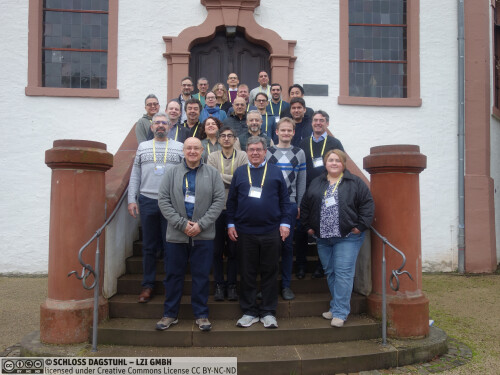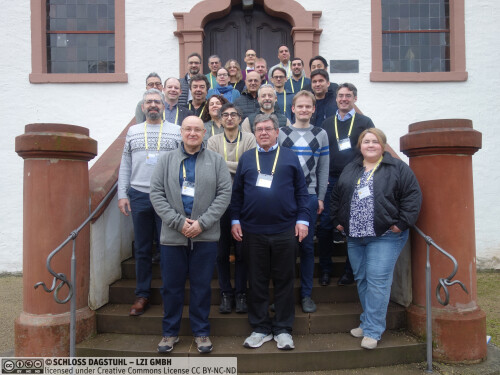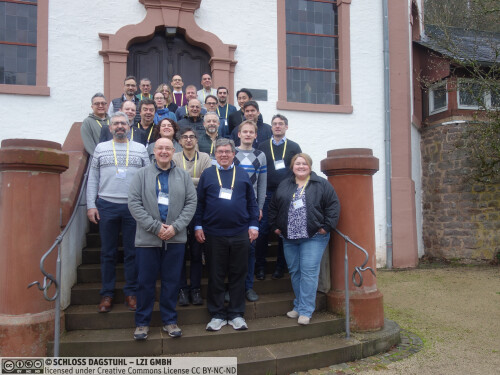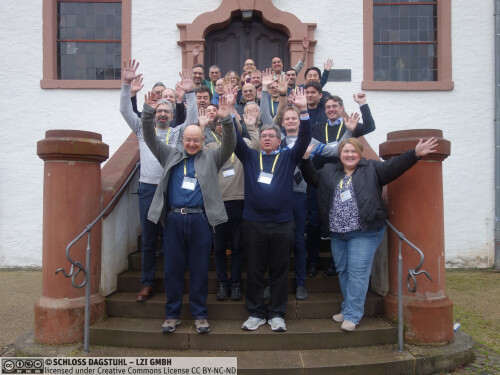Dagstuhl Seminar 24512
Quantum Software Engineering
( Dec 15 – Dec 20, 2024 )
Permalink
Organizers
- Shaukat Ali (Simula Research Laboratory - Oslo, NO)
- Johanna Barzen (Universität Stuttgart, DE)
- Andrea Delgado (Oak Ridge National Laboratory, US)
- Hausi A. Müller (University of Victoria, CA)
- Juan Manuel Murillo (University of Extremadura - Cáceres, ES)
Contact
- Marsha Kleinbauer (for scientific matters)
- Susanne Bach-Bernhard (for administrative matters)
Dagstuhl Reports
As part of the mandatory documentation, participants are asked to submit their talk abstracts, working group results, etc. for publication in our series Dagstuhl Reports via the Dagstuhl Reports Submission System.
- Upload (Use personal credentials as created in DOOR to log in)
Dagstuhl Seminar Wiki
- Dagstuhl Seminar Wiki (Use personal credentials as created in DOOR to log in)
Shared Documents
- Dagstuhl Materials Page (Use personal credentials as created in DOOR to log in)
Under the umbrella of quantum information theory, quantum-relevant algorithms have been proposed. In some cases, their relevance is due to the reduction of the order of complexity with respect to solutions in the classical world. In other cases, the relevance is due to the emergence of innovative solutions, such as obtaining more accurate predictions with less trained neural networks. The entry into the NISQ era with the development of the first quantum computers and simulators now makes it possible to test such algorithms on real computers. This raises new expectations and fosters a growing interest in quantum computing from both research and development.
Lessons learned from classical software engineering highlight that industry will only adopt quantum computing if quantum software can be developed with appropriate engineering procedures. Therefore, quantum software engineering (QSE) is already a necessity. The question arises whether everything learned in the last decades is still applicable in this new era. The interest in this question is evidenced by the growing number of small forums that are organized every year, mostly in the form of workshops associated with conferences such as Q-SE at ICSE, QSW at IEEE Services, or Q-SET at IEEE Quantum Week, to name but a few.
Although the papers presented in these forums cover very interesting specific aspects addressed by different research teams, a deeper reflection on the nature and scope of Quantum Software Engineering is needed. This reflection should address questions such as the differences between Classical and Quantum Software Engineering, which features of quantum software can and cannot be addressed with known classical techniques, which classical techniques should be extended or modified, and which new software engineering techniques should be developed to address quantum software from an engineering perspective.
After a first day dedicated to the topic "When Software Engineering meets Quantum Mechanics", this seminar proposes the following topics to discuss about as a warm start:
- Quantum Software Design, Modelling, and Architecting
- Quantum Software Quality Assurance
- Adaptive Hybrid Quantum Systems
The main outcomes expected from the Dagstuhl Seminar on Quantum Software Engineering are twofold:
- On the one hand, creating a community of researchers with focus, not only in the specific problems that they are facing regarding building Hybrid Systems but also in the Quantum Software Engineering as a discipline and in which they are connected with different problems being addressed by different researchers.
- A roadmap of Quantum Software Engineering providing structure to the discipline and showing the different problems to be addressed in the field, how they connect with each other, the dependencies between them, the different research teams with interest in such problems and an agenda with milestones to be reached in the coming years regarding the development of the field.
 Shaukat Ali, Johanna Barzen, Andrea Delgado, Hausi A. Müller, and Juan Manuel Murillo
Shaukat Ali, Johanna Barzen, Andrea Delgado, Hausi A. Müller, and Juan Manuel Murillo
Please log in to DOOR to see more details.
- Shaukat Ali
- Paolo Arcaini
- Antonio Brogi
- José Campos
- Schahram Dustdar
- Michael Falkental
- Sebastian Feld
- Michael Felderer
- José Manuel García Alonso
- Ignacio García Rodríguez de Guzmán
- Kostas Magoutis
- Wolfgang Mauerer
- Andriy Miranskyy
- Anila Mjeda
- Hausi A. Müller
- Juan Manuel Murillo
- Yehuda Naveh
- Ricardo Pérez-Castillo
- Antonio Ruiz Cortés
- Shinobu Saito
- Ina Schaefer
- Laura Schulz
- Ulrike Stege
- Robert Wille
- Manuel Wimmer
- Lei Zhang
Classification
- Emerging Technologies
- Information Theory
- Software Engineering
Keywords
- Quantum Software Design
- Modelling
- and Architecturing
- Adaptive Hybrid Quantum Systems
- Quantum Software Quality Assurance





 Creative Commons BY 4.0
Creative Commons BY 4.0
